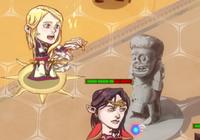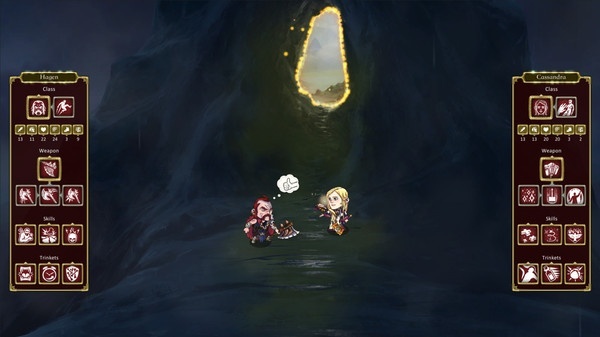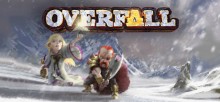Overfall (PC) Preview
By Leo Epema  26.04.2016
26.04.2016

Overfall is an open-world roguelike game made by indie developer Pera Games, and the first game the team is developing at that. At first blush, it seems like a pretty typical fantasy role-playing experience, but exactly what lies in the depths of the seemingly still waters of its overworld? Cubed3 checks out the Steam Early Access build ahead of its planned release later this year.
Starting up the game, we are treated to a spoken (and badly cadenced) story about a realm that lost its king, and it is this realm, your realm, that a Viking-like people has decided to invade through a magical portal. They're slowly starting to build a shipyard to pillage the plentiful islands on the globe. Perhaps this makes the Overfall sound consistently grim to the point of dullness, but it handles side-quests in a refreshing, often humoristic way with a cartoony style.
That said, it would've been funnier if the big-headed characters actually noticed the invasion and commented on it in some way. As it is, it feels as though the main story only serves to make you avoid enemy ships like some sort of far too easy mini-game. Still, it encourages you to visit islands containing random side-quests that vary in difficulty and tell small self-contained stories. Those stories can range from teaching a goblin to be less insulting and to make friends that way (because that's really all he wanted), to being told an interactive battle-oriented story about betrayal… by a crabby corpse. Who needs logic? The storylines are often about fantasy tropes, only spoofed and made ironic or flat-out silly.

While Overfall satirises fantasy tropes, it also celebrates them by providing a nice role-playing experience in that you can find weapons, skills, and healing and upgrading items for your two starting characters (fighter and cleric). You can also find companions on random islands, who have specific RPG classes you really need to supplement your team with. Only two of them can join your starting duo, forcing you to think about a good team composition, which is nice. Another good thing about it is that you want to find the companions, so that's another reason to sail the map, and that puts you in danger of leaving the comfort of islands that contain bazaars - places where you can put spells on your weapons and trade items.
The items in question are healing items (food), upgrading and purchasing items (frags), and items used for the protection and resurrection of characters (runes). In other words, the game puts you in dangerous situations and you need to know when to roll the dice. Even visiting an island and fighting a few enemies could prove fatal because of their skills and your lack of skills and companions. If the encounter kills both your characters, it's game over, though you keep your unlocks, and death is permanent for each character unless you resurrect them at altar islands in return for a rune. Now, this all sounds very positive, but at the same time, you wish there was a way to recruit companions immediately, rather than watching them leave their original island first, perhaps through trading with or hiring them. The player could use more agency - after all, it is an RPG, and RPGs are about choices.

Similarly, the degree of tactics required during story encounters is low, too. Many quests only offer two dialogue choices, both of which are sometimes acceptable. Fortunately, companions can steer quests in different directions, which is great. For example, the amazon can give the option to avoid battling enemies by sneaking past them, simultaneously granting a map to use as a dialogue option further down the line. Still, there's a sense of a lack of consequences - a lack of immersion - as saving or helping bad guys won't result in a new quest or negative consequences to the overworld. Why not let a dangerous ship pursue you for your choice to free a witch, or even incite a battle with somebody that you could join in with? Instead, you just get rewarded for the quest, and nothing comes of it. It would also be more interesting if companions gave extra diplomacy options or other dialogue choices. Then different companions could even give different quest rewards. Again, an element of role-playing, choice and consequence is being missed.

What Overfall gets right, though, is the presentation. There are many different types of side-quest islands to be found, such as barren islands or forest islands, and each stage looks distinct. In addition, they look like watercolours, which, in combination with their bright colours, is pleasing to the eye. They are perhaps a bit bland sometimes in the sense that they look like typical European age of discovery RPG fare. Sometimes, you just wish the environments had their own style that didn't reflect the real world, because the game is, after all, inhabited by ice zombies, goblins and such. Not only that, but the environments look more serious and realistic than the cartoony characters, which may break immersion. Regardless, it's all so upbeat it makes you want to explore. On the other hand, the environments could've benefitted from light adventure aspects, such as hidden items or clues about your dealings with characters - more adventure for this adventure-themed game. The music is amazing, clear, and appropriately epic, making you believe this world is actually about heroes and demons and far-off lands… even if islands are, humorously, everywhere.
To end on a high note, the combat is fun. It's turn-based and tile-based, consisting of three battle phases: movement, utility, and attack. Some characters need to be positioned well to heal others. For instance, the cleric can pull a teammate to her and heal them, but only if the teammate is in front of them or on a diagonal. Other characters may do area damage, making it useful to get enemies to huddle together. Each character class has its own skills and its own specialisation. Healing seems silly, though, because enemies put many debuffs on your characters, and which ones are healed first tends to be random. That restrains your freedom a bit much, forcing you onto a more healing-oriented path. It's also tough to see which (de)buffs have been applied, because the icons are tiny and lack visual cues, making it necessary to break the flow of battle to inspect them. The skills have cooldowns, requiring some planning for which turn to use them on. It's just a shame you can't see which enemies have which skills, because that would allow you to plan your next move more efficiently.

Final Thoughts
Overfall is decent so far. It provides laughs - as well as more serious plots - it scratches a basic roguelike itch, and it offers good replay value with its unlockable weapons, skills, and companions. If you want something to play on even the crappiest of laptops, while at the same time getting simple, but dangerous, tactical combat with elements of randomness, this should be given a try.
 C3 Score
C3 Score  7/10
7/10
Reader Score  0
(0 Votes)
0
(0 Votes)
 Out now
Out now  Out now
Out now  None
None  Out now
Out now
Comments
Comments
Overfall is decent so far. It provides laughs - as well as more serious plots - it scratches a basic roguelike itch, and it offers good replay value with its unlockable weapons, skills, and companions. If you want something to play on even the crappiest of laptops, while at the same time getting simple, but dangerous, tactical combat with elements of randomness, this should be given a try.

![]() 7/10
7/10
![]() 0
(0 Votes)
0
(0 Votes)
 Out now
Out now  Out now
Out now  None
None  Out now
Out now Comments are currently disabled

 Sign In
Sign In Game Details
Game Details Subscribe to this topic
Subscribe to this topic Features
Features







 Top
Top

